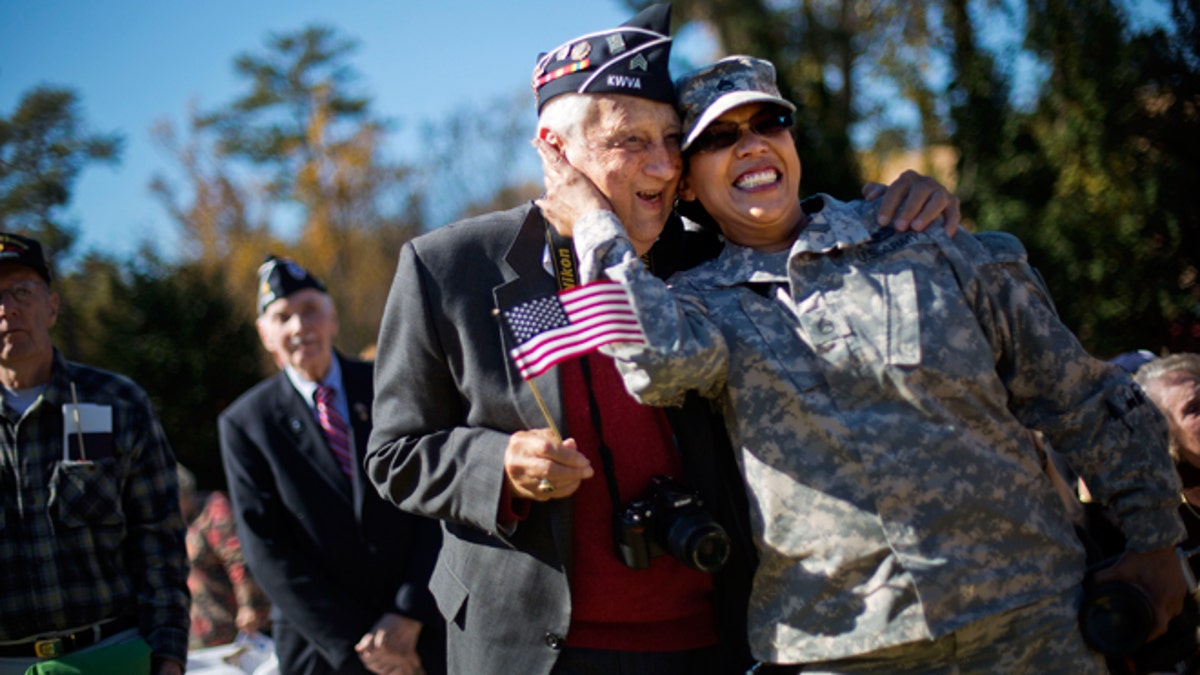
Nov. 11, 2014: U.S. Army Georgia National Guard Staff Sgt. Tracy Smith, right, a veteran of the wars in Iraq and Afghanistan, embraces Korean War veteran Jim Conway, 84, as military service members are asked to sing along to the Armed Services Medley during a Veterans Day ceremony at the Atlanta History Center. (AP Photo/David Goldman)
“I frequently see my father sitting and smiling at conversations. He will ask for a conversation to be repeated only once and then just nods. Frustrated that he is not able to participate, often he will just go to bed. He is a great family man and this is hard for all the family to watch.” The daughter of Dilbert Neitzel, a World War II Veteran, recalling her father’s daily reality before he passed away earlier this year.
This is a familiar reality for thousands of our veterans – and their families. Veterans, both old and young, are seeking help from the VA for hearing loss and tinnitus more than any other disabilities facing them today: the demand for audiology services is growing at nearly 10 percent every year.
Since the Phoenix VA scandal broke last year, the number of veterans on wait lists for appointments has increased by 50 percent. According to the VA, nearly half of all patients on the lists are waiting for audiology services. The VA simply does not have the capability to keep up.
Why is that? As it stands today, the VA is only allowed to use audiologists to provide hearing services to veterans. While audiologists are a great resource for the VA and provide good service for veterans, there are not enough of them to keep up with the demand.
Rep. Tim Walz (MN-01) and I introduced legislation to change the system and get veterans more timely access to the care many of them desperately need. H.R. 353, the Veterans’ Access to Hearing Health Act, would allow the VA to use hearing aid specialists, of which there are many more and often they are easier to get to.
Hearing aid specialists have gone through a 1 to 2 year apprenticeship-training period, have completed a comprehensive written exam, and are certified by the state to fit and sell hearing aids. They are qualified to support the specialized services of audiologists by fitting, adjusting, and making minor repairs to hearing aids. By allowing hearing aid specialists to serve in their licensed role at the VA, the current burden audiologists have of performing all hearing services will be lifted.
With the provisions of H.R. 353 in place, VA audiologists can turn their attention to specialized cases and complex conditions, and people like Mr. Neitzel will not have to wait months at a time for simple hearing adjustments.
H.R. 353 has the support of the National Guard, the Retired Enlists Association, Veterans’ Health Council, the American Academy of Otolaryngology, the Wisconsin American Legion, and I am very glad to note that Tuesday it will be considered before the House Veterans Affairs committee.
Our veterans missed many important family conversations while away defending our freedom; they should not have to continue to miss precious family time upon their return.
We can never repay our debt to veterans like Mr. Neitzel, but at a time when the VA is desperate for some good news, this is an opportunity for Congress and the VA to get it right.
I remain grateful to all of our military men and women – and their families – for their service to our nation. I am hopeful that, when H.R. 353 is considered before the committee on Tuesday, my colleagues will heed the opportunity to help veterans get the care they need – and have earned -- and support this simple fix.
Republican Sean Duffy represents Wisconsin's 7th district in the U.S. House of Representatives.








































